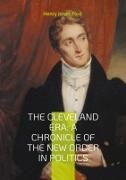Read more
' The Cleveland Era: A Chronicle of the New Order in Politics ' offers a meticulous exploration of a transformative period in American politics. Henry Jones Ford delves into the late 19th century, focusing on Grover Cleveland's presidency and the significant shifts that redefined the nation's political landscape.
Ford examines the decline of the patronage system, highlighting the emergence of merit-based civil service reforms. He provides insight into the Democratic Party's evolution, detailing how it navigated the complexities of political realignment and responded to the burgeoning populist movements.
The narrative addresses the challenges Cleveland faced, including the free silver debate and the push for tariff reform. Ford's analysis underscores the tension between traditional political practices and the growing demand for transparency and accountability.
This work serves as a valuable resource for understanding the intricacies of 19th-century American politics. It offers readers a comprehensive view of the era's political reforms and the enduring impact of Cleveland's leadership on the nation's governance.
About the author
Henry Jones Ford was a distinguished American political scientist and historian, renowned for his in-depth analyses of governmental structures and political dynamics. Born in 1851, Ford's academic journey led him to prominent roles, including professorships at Johns Hopkins University and Princeton University.
Ford's scholarship was characterized by a commitment to understanding the evolution of American politics. His works often focused on the mechanisms of political reform and the shifting paradigms within the Democratic Party during the 19th century.
In ' The Cleveland Era ', Ford applies his expertise to dissect the complexities of Grover Cleveland's presidency. He examines the challenges of political patronage, the rise of populist sentiments, and the broader implications of political realignment.
Ford's contributions extend beyond academia; his insights have influenced contemporary understandings of political reform and governance. His legacy endures through his meticulous documentation of pivotal moments in American political history.

